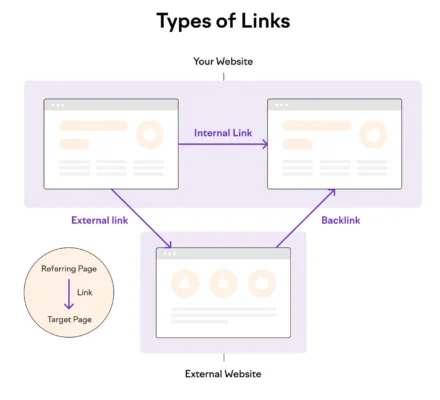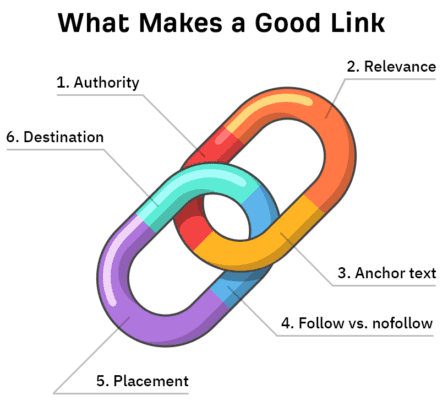Introduction
Have you ever wondered why certain websites appear first when you search on Google? One primary reason is backlinks. But what exactly are they?
Here’s what we’ll explain: backlinks in SEO are external links pointing to a page on your website. Because they direct traffic to your website from another website, they are also known as inbound links. The quantity and quality of your backlinks play a significant role in how highly search engines such as Google and Bing rank your website.
In this guide, we’ll go over everything you need to know about how essential backlinks are in SEO. We’ll discuss many links, such as links from other websites and links between pages on your website. You’ll learn how to get these links to help your SEO efforts. We’ll also explain the most powerful types of backlinks that can boost your site’s ranking.
What are backlinks?
Do you know that a backlink refers to a link one website obtains from another? Besides increasing brand visibility and driving referral traffic, backlinks are essential for improving SEO performance. While some websites naturally attract backlinks, marketers often employ strategies to acquire and maintain them actively.
For instance, imagine a fitness blog receiving a backlink from a reputable health magazine. In this scenario,
- The health magazine is the referring site, and it includes an external link (an outbound link) to the fitness blog.
- The fitness blog is the recipient site, gaining an inbound link from the health magazine (an incoming link).
Consider a tech startup earning a backlink from a well-known industry influencer’s website. Here:
- The influencer’s website is the referring site, linking to the tech startup (an outbound link).
- The tech startup benefits from an inbound link from the influencer’s website (an incoming link).
So, links that connect pages within the same website are called internal links.
We want you to know that understanding how backlinks work and implementing effective strategies to acquire them can significantly boost a website’s authority and search engine rankings.
Are backlinks important for improving SEO?
What exactly are backlinks, then? Since they serve as suggestions to Google, they are essential for SEO. Generally, a page or website appears more authoritative the more backlinks it has, especially from reliable sites like Microsoft.com.
Furthermore, these links aid Google in finding and ranking your content more efficiently and boosting traffic. They function as online links, pointing search engines to your website. By concentrating on high-quality backlinks and producing insightful content, you can improve your SEO. As a result, you can significantly raise the visibility of your website and draw in more natural visitors from Google.
Speaking of authority, backlinks from respectable domains enhance your website’s credibility and facilitate Google’s ability to locate and prioritize your content. Consider it as constructing bridges over the internet. In addition to increasing traffic, every link aids in search engines’ indexation and navigation of your website.
Types of backlinks to improve SEO
Although backlinks are essential for improving SEO, remember that Google considers many other criteria when determining rankings. However, investing in a solid backlinking strategy is necessary to receive a lot of organic traffic from Google. The following categories of backlinks can help with SEO:
1. Editorial backlinks:
These links include high-quality material, such as articles or infographics, that use your website as a source. Editorial backlinks are significant because they reflect experience and authority in your sector, helping your site appear more trustworthy to search engines and improving SEO.
- Backlinks to guest posts:
Guest posting on respected websites allows you to include a link to your website in your material. Guest articles will enable you to reach new audiences and establish authority by giving important views and information about your expertise.
-
Backlinks to your company profile:
There is another type of backlink to improve SEO. Creating profiles on business directories, social networks, and review sites that link to your website will enhance your online presence. These profiles act as recommendations and let search engines know that your business is established and trustworthy.
-
Backlinks to your webinars:
Hosting a webinar and making the recording available online can attract backlinks from websites that find your content valuable. Webinars demonstrate your expertise and provide helpful information that other websites can link to, supporting your SEO efforts and helping backlinks improve SEO.
-
Free-Tool Backlinks:
Offering accessible tools or resources related to your industry, like calculators or software, can attract backlinks from websites looking to provide valuable resources to their audience. Promoting your free tools to relevant websites helps increase visibility and generates backlinks that contribute to long-term SEO benefits.
Dofollow inbound links: boosting search engine marketing authority
A do-follow one-way link is a hyperlink that transfers authority, or “hyperlink juice,” from one internet site to another. It signals engines like Google to comply with the hyperlink and remember it as a signal to agree with the related internet site.
You should also realize that following inbound links is extraordinarily valuable for search engine marketing. It raises a website’s authority and contributes to advanced search engine rankings.
Nofollow inbound links: their effect on search engine marketing
In contrast, nofollow inbound links are hyperlinks that do not transfer authority or hyperlink juice from one web website online to another. The nofollow characteristic tells engines like Google to no longer comply with the hyperlink or to remember it as an endorsement for the online-related website.
Initially, nofollow inbound links were developed to combat unsolicited mail and low-quality hyperlinks. They do not immediately affect a site’s search engine marketing performance; however, they could increase visitors and enhance your online visibility.
Are all backlinks beneficial for SEO?
Not all backlinks help your SEO efforts.
Firstly, there are nofollow links that prevent search engines from passing SEO power to the linked site. These links include attributes like:
- rel=”nofollow”: Indicates the linking site doesn’t endorse the target site.
- rel=”sponsored”: Shows the link was paid for.
- rel=”UGC”: Indicates the link is in user-generated content.
Links without these attributes are known as follow or do-follow links.
More importantly, Google disregards backlinks from low-quality or irrelevant content or spammy sites it doesn’t trust enough to influence search results.
While building up nofollow and low-excellent inbound links naturally is common, it is usually no longer profitable to actively look for them for search engine marketing purposes.
More importantly, avoid growing inbound links that violate Google’s guidelines on hyperlink spam, also called toxic inbound links.
Engaging in practices like:
- Paying for the following links
- Participating in link exchanges
- Using automated tools to create links
- Overusing keywords in anchor text in a spammy manner
What Makes a Strong Backlinks in SEO?
It’s vital to recognize what constitutes strong backlinks in SEO. When constructing inbound links, it is essential to prioritize quality over quantity. This approach specializes in obtaining hyperlinks from respectable websites.
These excellent inbound links enhance your site’s authority and credibility, both naturally and morally. This technique no longer most effectively improves your search engine ratings but builds a solid basis for long-term achievement in SEO.
- Authority of the Source
- What it means: Backlinks from reputable websites carry more weight.
- Why it matters: High-authority sites can pass more authority to your site.
- Relevance to Your Content
- What it means: Links from sites on topics similar to yours are more valuable.
- Why it matters: It shows that your content is credible within its niche.
- Anchor Text
- What it means: The clickable text of a link.
- Why it matters: Relevant anchor text helps search engines understand what your page is about.
- Placement on the Page
- What it means is where the link is located within the content.
- Why it matters: Links within the main content area are likelier to be clicked and pass more authority.
- Follow vs. Nofollow Links
- It means whether the link instructs search engines to follow and pass authority.
- Why it matters: Followed links significantly impact rankings, but nofollow links can still bring traffic and visibility.
- Destination Page
- What it means: The specific page on your site that the link points to.
- Why it matters: Direct links to essential pages can improve their search engine rankings.
Conclusion
In conclusion, we’ve explored the significance of backlinks in SEO. They serve as essential validations from other websites, indicating to search engines like Google the credibility and authority of your site. Quality backlinks gained naturally from credible sites are significantly more helpful than quantity.
Finally, they help establish a reliable online presence and improve your website’s visibility in search engine results. These backlinks are essential for improving SEO because they will help you build relationships within your sector and draw in valuable backlinks to your website, which will help you optimize your SEO approach.
We have concluded that to effectively increase your SEO efforts, you should produce valuable content and cultivate relationships with relevant websites to obtain high-quality backlinks.

